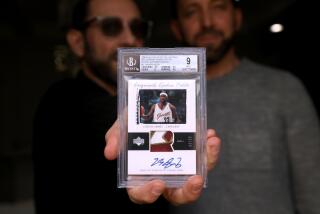You’ve Got to Give Him Credit--Almost Everyone Else Has
- Share via
To Theodore E. Palmer, his plastic wall is a work of art--a thing of beauty to be admired, shown off, fussed over and not touched.
He figures it is worth $1 million, but it is common for art lovers to exaggerate the value of their collections.
For a man once well acquainted with poverty, 105 credit cards amassed in one place can be viewed as a glorious splash of color, excitement and promise.
After one private exhibition for a visitor, Palmer closed the door to the secret room where his unique arrangement hangs and said, “I know I should cut them up but they’re so pretty. I guess I’m just not ready yet.”
The Pasadena chiropractor began his strange collage inadvertently 10 years ago.
He said a major gasoline company offered him a credit card and a postage-paid envelope for mailing his application. So he got a line of gasoline credit that he really did not want without spending a cent, and wondered how far this new phenomenon could be carried without costing him anything.
For several years Palmer remained a dabbler, collecting credit cards that just came to him by mail when he returned postage-paid applications. He glued them on a wall where he could admire them.
One day he realized that with only 12 more he would have 100. He sent more applications, sometimes spending money on stamps, and sometimes even requesting cards. Now there are 105, and he has been assured that a couple more are on their way.
Palmer said he has never used any of the cards and has never paid a fee that some credit firms charge annually. Many cards in his collection expired long ago.
He has credit cards for a women’s clothing chain that specializes in large sizes, department stores in Chicago, Dallas and Las Vegas, a gasoline company in Wyoming and a defunct variety store chain.
Many of the cards he holds are still valid and offer credit up to $10,000, Palmer said.
He has felt tempted to use some of them but never has, he said.
Palmer, 50, describes his youth as “rejected, ejected and dejected. I couldn’t borrow a dime for anything. Twenty years ago I was dead broke.”
His plastic collection, he said, “is security--psychologically, this builds my feeling of worth.”
Palmer said he and his wife, Mary, live modestly and use only a couple of credit cards that they keep in their wallets, not on their wall, for gasoline and occasional nights out.
“I live within my income. Well below,” Palmer said. “I have no expensive tastes. I try to live like a chipmunk, saving my acorns for a rainy day.”
His only extravagance, Palmer said, is his amateur radio equipment. He has made radio contacts around the world, and has another collection of cards pasted on another wall to prove it. Called confirmation cards, they are sent from one ham radio operator to another to confirm that they have contacted each other. Some of Palmer’s came from Argentina, Easter Island, Tahiti and Tasmania.
Now he has a new item for what might start still another unusual collection. It is a letter from a Texas department store rejecting his application for a credit card because of “credit bureau inquiries.”
“That doesn’t mean bad credit, and it doesn’t mean violation of any credit regulations. I think it means I blew the fuse,” Palmer said. “I think when they push the computer button for my credit rating, 10 pages come out.”






